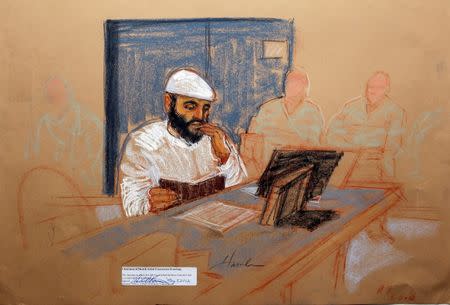Yemeni suspect in 9/11 attacks asks court to halt harassment

By Lacey Johnson FORT MEADE, Md. (Reuters) - Attorneys for a Yemeni man accused in the Sept. 11 attacks asked a military judge on Friday to halt court proceedings until Guantanamo Bay prison guards stop tormenting their client. Ramzi bin al Shibh, 43, testified during a pre-trial hearing on Wednesday that guards have used noises and vibrations to abuse him and disrupt his sleep for years. He said prison staff had refused to comply with a 2013 order by Judge Army Colonel James Pohl to stop any harassment of him. Prosecutors at the military tribunal suggested bin al Shibh was either delusional or lying. Bin al Shibh’s attorney, James Harrington, said: “Both he and I were concerned about potential retaliation when he returned to camp, given the testimony he had given.” Harrington said he received a letter from Bin al Shibh that said guards at the military base in Cuba punished him with noises following his testimony. When Bin al Shibh complained to a commander, Harrington said, the officer “raised his middle finger to him and said he likes things upside down, and he’s going to keep it that way." He asked Pohl to order an independent investigation and halt proceedings in the death penalty case against Bin al Shibh and four alleged co-conspirators. Pohl called a camp commander to the witness stand and asked him whether the guards were obeying his order. The commander, who remained anonymous, said the order was posted outside Bin al Shibh’s cell and had been followed by the guard staff. Pohl did not say whether he would order an investigation. Defence teams also argued on Friday for a temporary order barring female guards from touching prisoners to be made permanent. Pohl issued the no-touch order in January 2015 after Muslim detainees complained that physical contact with women outside their immediate families went against their religion. In December a former commander testified that the no-touch order hurt staff morale and increased security risks at Camp Seven, the secret part of the prison where the United States keeps former Central Intelligence Agency captives. President Barack Obama launched a final push this week to persuade Congress to close Guantanamo Bay prison despite strong opposition from lawmakers who do not want detainees transferred to the United States. The Guantanamo Bay hearing was monitored by closed-circuit television at Fort Meade, outside Washington. (Editing by Ian Simpson and Steve Orlofsky)

